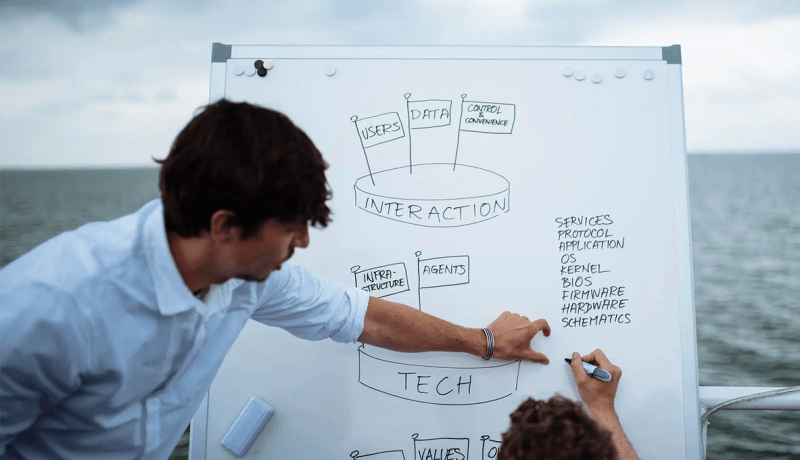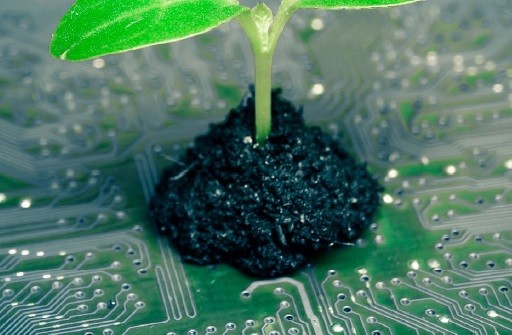Machine Rebel with a Cause: Chris Julien on Ethical Electronics and More
October 13, 2022
on
on

Chris Julien is a researcher at Waag Futurelab for technology and society while doing his PhD in "Ecological governance: Deep adaptation machines." He is also part of the climate activism group Extinction Rebellion, taking part in climate protests that block off roads and institutions. “Like a lot of people, I am really concerned about our climate," he explains. "I got involved in Extinction Rebellion because I felt really motivated by their way of acting. Being arrested has made me a legal ‘object of interest’ for the state but I have yet to pay one fine. My main consequence is that I feel less powerless and frustrated now. It has brought me more mental health and a bit of extra spine.”
We recently asked Julien about ethics and ethical electronics.
Priscilla: What ethics in electronics are you working on?
Chris: Extinction Rebellion says that change happens at governance. Individual change is not going to solve our collective climate problem. Extinction Rebellion has three demands: to tell the truth, to act now and to let citizens decide. You can take these demands as general principles of behaviour but they also provide concrete action.
To tell the truth in electronics would be to communicate openly about all the people and all the resources involved, and the future of those people and resources. There is so much going on around making an iPhone that is problematic. You can start by being honest about the problems, the dilemmas and how you work with them because that creates space for change. This is happening at now at EU-level. Problems are being acknowledged and today we heard we all get the same phone-charger. This is symbolic for a lot of stuff going wrong in the electronics industry. Wasteful stuff.
More money is spent on optimistic technology that may or may not help us in the future. While we have all the technology we need for the green transition. Various studies say we could have a 100% renewables-based energy system in 2030. I’ve never heard government admit that it is technically possible but that they’ve decided to take another path.
Act now. Once you are honest about your supply chain and the challenges you are facing, this will show many avenues of improvement. Where you can act now within planetary boundaries. Green transitions and electronics are incredibly resource intensive. This is a challenge to manufacturers and developers to understand what product is useful and what isn’t. You need to reckon with them as a citizen but you also have to think further than the status quo as a business. Things will shift rapidly in the coming 10 years. We really have to be more adaptive and have a different design style. We need to innovate with modest means, we need new paradigms of design. There is so much room for improvement.
Citizens decide means that it is up to all of us. To choose to make the difference, in our workplaces, communities and civic life. This is a democratic right and a responsibility for us all, including the electronics industry.
Priscilla: What is the most important ethical question in your field?
Chris: Extinction Rebellion has three demands and ten principles. One of them is no blaming and shaming because we are all part of the toxic system. Still, there are CEOs of big fossil fuel companies that know the consequences of what they are doing. The moral dilemma is; do you single these people out? I think that they are responsible as some people have more agency than others. In electronics you have CEOs but also pioneer mavericks (mostly men) that do have a bigger responsibility and should be held to a higher standard. On the other hand, even if you hold them to account it is also good to understand that nobody is pure evil. People are also jut going through the motions according to habit.
Priscilla: What would you like to include in an Electronics Code of Ethics?
Chris: The apparatus is bigger than the machine. The whole world of a machine is so extended in time and space, touching so many people’s lives. See it as part of your professional ethics to really understand the supply chain going back and also the life of the product. Ask critical questions in terms of the impact on people and planet of the whole apparatus.
Priscilla: An impossible choice: People that are in the process of making electronics, should they worry most about A) humans B) materials or C) time?
Chris: A. If we take care of each other, we can pay it forward. If you only look at stuff you get the paperclip thing with the AI optimising the world into paperclips. We are so hyper focused on time already, we almost lost time trying to squeeze so much out of it. Worry most about humans.”
We recently asked Julien about ethics and ethical electronics.
Priscilla: What ethics in electronics are you working on?
Chris: Extinction Rebellion says that change happens at governance. Individual change is not going to solve our collective climate problem. Extinction Rebellion has three demands: to tell the truth, to act now and to let citizens decide. You can take these demands as general principles of behaviour but they also provide concrete action.
To tell the truth in electronics would be to communicate openly about all the people and all the resources involved, and the future of those people and resources. There is so much going on around making an iPhone that is problematic. You can start by being honest about the problems, the dilemmas and how you work with them because that creates space for change. This is happening at now at EU-level. Problems are being acknowledged and today we heard we all get the same phone-charger. This is symbolic for a lot of stuff going wrong in the electronics industry. Wasteful stuff.
More money is spent on optimistic technology that may or may not help us in the future. While we have all the technology we need for the green transition. Various studies say we could have a 100% renewables-based energy system in 2030. I’ve never heard government admit that it is technically possible but that they’ve decided to take another path.
Act now. Once you are honest about your supply chain and the challenges you are facing, this will show many avenues of improvement. Where you can act now within planetary boundaries. Green transitions and electronics are incredibly resource intensive. This is a challenge to manufacturers and developers to understand what product is useful and what isn’t. You need to reckon with them as a citizen but you also have to think further than the status quo as a business. Things will shift rapidly in the coming 10 years. We really have to be more adaptive and have a different design style. We need to innovate with modest means, we need new paradigms of design. There is so much room for improvement.
Citizens decide means that it is up to all of us. To choose to make the difference, in our workplaces, communities and civic life. This is a democratic right and a responsibility for us all, including the electronics industry.

Priscilla: What is the most important ethical question in your field?
Chris: Extinction Rebellion has three demands and ten principles. One of them is no blaming and shaming because we are all part of the toxic system. Still, there are CEOs of big fossil fuel companies that know the consequences of what they are doing. The moral dilemma is; do you single these people out? I think that they are responsible as some people have more agency than others. In electronics you have CEOs but also pioneer mavericks (mostly men) that do have a bigger responsibility and should be held to a higher standard. On the other hand, even if you hold them to account it is also good to understand that nobody is pure evil. People are also jut going through the motions according to habit.
Priscilla: What would you like to include in an Electronics Code of Ethics?
Chris: The apparatus is bigger than the machine. The whole world of a machine is so extended in time and space, touching so many people’s lives. See it as part of your professional ethics to really understand the supply chain going back and also the life of the product. Ask critical questions in terms of the impact on people and planet of the whole apparatus.
Priscilla: An impossible choice: People that are in the process of making electronics, should they worry most about A) humans B) materials or C) time?
Chris: A. If we take care of each other, we can pay it forward. If you only look at stuff you get the paperclip thing with the AI optimising the world into paperclips. We are so hyper focused on time already, we almost lost time trying to squeeze so much out of it. Worry most about humans.”
Dive Into Ethical Electronics at WEEF 2022
Interested in the topic of ethical electronics? WEEF 2022 starts on Tuesday, November 15, 2022, at 10.00 CET at electronica in Munich. Visit hall B3.540 to attend in person. If you can't attend the event in Munich, you can watch it online. Would you like to participate? Tell the committee about your suggestions for speakers and discussion topics! Let us also know if you want to speak, contribute a video, or join a debate about ethical electronics.
Read full article
Hide full article



Discussion (3 comments)